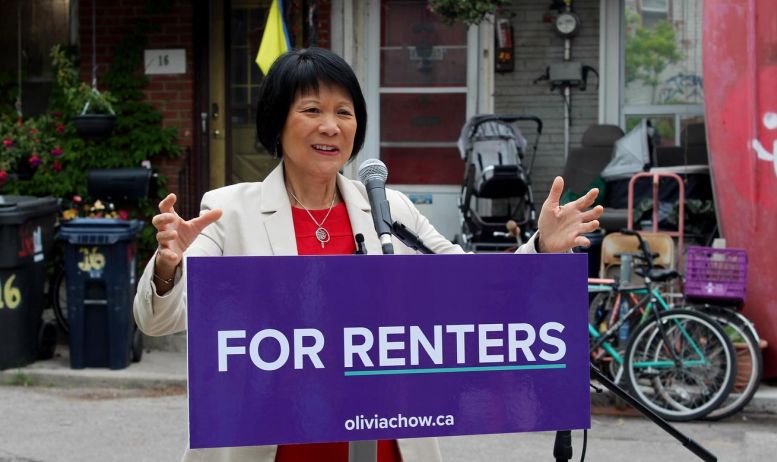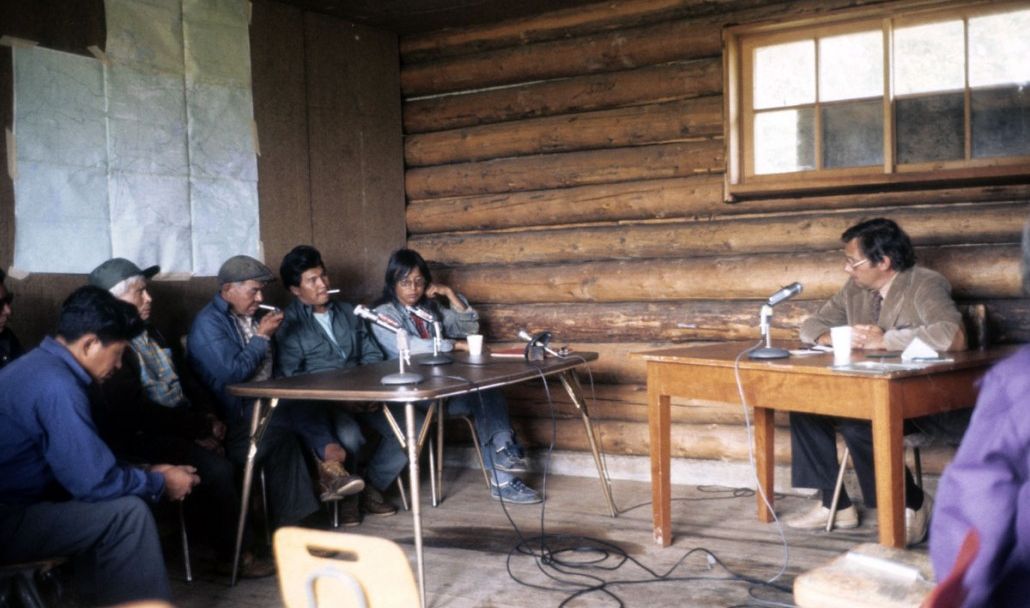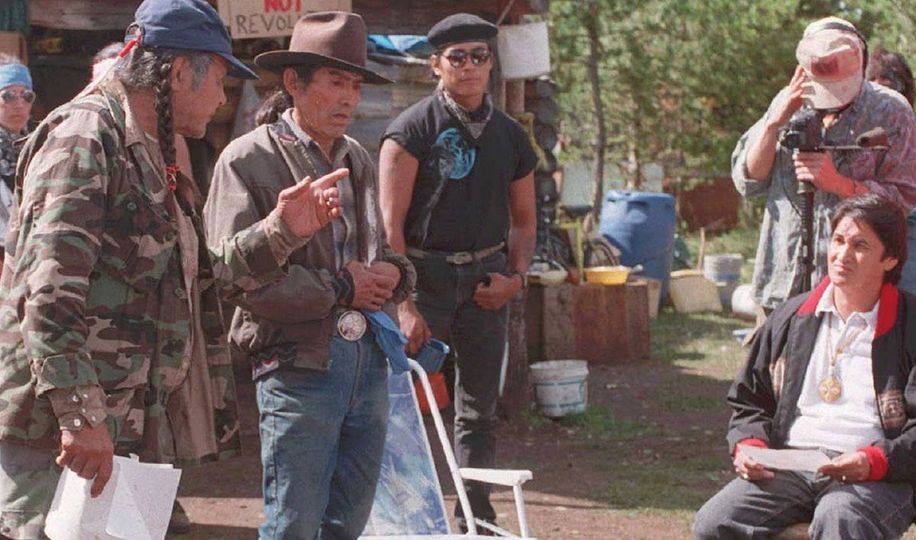Olivia Chow, former NDP MP and city councillor, is Toronto’s new mayor, the first “progressive” or left-of-centre elected since David Miller back in 2003.
While issues around affordable housing, the exploding cost of living and the city’s ballooning financial deficit are worse now than they were back then, Chow’s victory marks a clear response to the neoliberal status quo of the past 13 years.
Though she declared her “heart is full,” and that she’s “ready to work,” Chow will not find it easy to move a progressive program through a majority right-wing city hall beholden to a right-wing provincial government, not unless she builds widespread support from working-class movements beyond the walls of city hall.
Results
In a 37 percent to 32 percent split, Chow edged past second-place Ana Bailão, the centrist city-councillor and spiritual successor to former-mayor John Tory. In a distant third came the more conservative Mark Saunders, Toronto’s former top cop, who received the blessing of premier Doug Ford, with 8.6 percent of the vote.
With over 100 candidates on the ticket, the vast majority had microscopic hauls. But of note was Anthony Furey (5 percent), the former Toronto Sun columnist and the favoured candidate of the far-right, who beat out left-leaning city councillor Josh Matlow (4.9 percent), Liberal MPP Mitzie Hunter (2.9 percent) and Chloe Brown (2.6 percent) as well as right-leaning Brad Bradford (1.3 percent) and the conspiracy theorist Chris “Sky” Saccoccia, who somehow got 8,000 votes (1.1 percent), while also claiming the election was rigged on Twitter.
Early in the running, polls showed Chow had a 10 percent lead over Bailão among decided voters which, given a point or two, she maintained for the next few weeks. Then came gains for Bailão, Saunders and Furey.
The final two weeks of the campaign saw a shift in dynamics, with Chow losing support as Bailao caught up, buoyed by two endorsements, one from ex-mayor John Tory and the other from the Toronto Star. The two right-wingers, Furey and Saunders, also picked up support heading into election day.
Overall turnout was low, at 38 percent. While not the historic pit of last year’s 29 percent, it’s a sharp decrease from 60 percent in 2014 and less than half of the 80 percent turnout before the city’s amalgamation in the 1970s. Still, the 9 percent increase in turnout from last election shows Torontonians were motivated by the kinds of ideas that were put forward in the campaign.
Also significant was the fact that Chow’s support went beyond the usual NDP strongholds in the downtown core, winning four out of five suburban Scarborough wards, traditionally the fiefdom of the Fords. This is a major setback for “Ford Nation,” although Etobicoke and the West of the city in general remain conservative strongholds.
All in all, the left-right split was practically down the middle. The centre left (combined vote of Chow, Matlow, Hunter and Brown) received 47.6 percent, versus the centre right (combined vote of Bailao, Saunders, Furey and Bradford) with 47.4 percent.
Union Support
Any progress towards a break from the status quo in Toronto will depend on the support of workers, especially those already organized. Of all the candidates, Chow received the most union endorsements, including from the public sector:
- Amalgamated Transit Union (ATU) Canada
- ATU Local 113
- CUPE Local, 4948 public library workers
- CUPE 3902, UofT education workers
- CUPE Ontario
- Elementary Teachers of Toronto
- Ontario Public Service Employees Union
- Toronto Secondary Unit-Ontario English Catholic Teachers’ Association
And from the private sector:
- Canadian Office and Professional Employees (COPE) Local 343
- United Food and Commercial Workers
- United Steelworkers Toronto Area Council
It’s unfortunate that the two main unions at City Hall — CUPE inside and CUPE outside workers — endorsed Ana Bailão, especially as both will be sitting across the bargaining table from a team headed by Chow when it comes to contract negotiations. Undoubtedly the two unions will determine their bargaining demands and tactics without reference to either mayoral candidate. However, by hitching their star to Bailão’s candidacy, their decision appears to have caused a rift in the local labour movement. An online petition started by Local 79 Rank and File, demanded the Executive rescind their endorsement of Ana Bailão and “institute a democratic process where members’ voices are heard and reflected in the union’s political decisions.” The petition says Bailão supported Tory’s efforts to reduce city services and members believe she isn’t “prolabour.” It cites her council votes in 2016 that opposed expanding child care subsidies and protecting TTC routes from cuts.
While union support is critical to winning working-class victories in elections, union support needs to continue beyond election day to secure the real changes workers need. Unions should be taking the lead in organizing and supporting campaigns to fight for and win the luxury homes tax as well as publicly-owned housing that working people need to be able to afford to live in one of the most expensive cities in the world.
Union leadership must mobilize their rank-and-file members to show up to rallies, meetings and events and to volunteer in these campaigns, to lend their weight towards the fight for the city we all deserve.
If union endorsements and donations come only during the election campaign without any follow-up, then the flag on the mast may have changed, but there’s no guarantee the boat will move in the direction it needs to. Grassroots movements of working-class people can be the wind in the sails.
Limited Council Powers
The powers of Mayor Chow and City Council are limited. They have little ability to raise taxation, apart from property taxes. They are not allowed to run a deficit or issue bonds. They are not allowed to set rules and conditions for workers. In addition, over the years the provincial and federal governments have cut services or downloaded them onto cities, without the needed additional funding. Toronto, like all Canada’s major cities, needs significant investment in infrastructure, both new services such as public transit, and repairing existing structures.
This, combined with a right-wing council, will no doubt complicate things for Chow. Without the leverage of mass support from organized labour and grassroots movements, there will have to be compromises to get anything done.
Any perceived failures will invite backlash and criticism from both ends of the political spectrum, but especially from the right, who will be eager to cast the mayor’s leadership as an example of the left’s inability to “get things done.”
Lessons
Facing a hostile city council and regional government doesn’t mean change isn’t possible. Socialist Alternative was on the frontline of the fight for a $15 minimum wage, which began in Seattle and later spread to Canada.
Rather than strike a deal with big business and corporate Democrats, SA member and Seattle city councillor Kshama Sawant looked to support from outside of city hall to push for real change.
In 2013, Sawant and Socialist Alternative launched the grassroots 15 Now campaign, in collaboration with progressive labour unions. The campaign included neighbourhood action groups, marches, and a democratic conference attended by hundreds of working-class people, who voted on decisions for how to direct the movement.
They faced fierce opposition not just from the right-wing, pro-corporate forces but also from some union leaders, who wanted to compromise and water down the movement’s demands, even at the peak of its strength.
But Kshama Sawant and Socialist Alternative — together with the best union leaders and the majority of workers in the 15 Now movement — stood their ground. It was clear that public support for a $15 minimum wage was surging, with a strong majority in the polls and large turnouts to rallies and marches. In the end, less than six months after Sawant was elected, the $15 minimum wage was passed unanimously by Seattle City Council before spreading to Alberta, BC and beyond.
The recent election in Toronto shows that residents of Canada’s largest city support a break from the centre-right status quo of city council, including supporting calls for a luxury homes tax and publicly-owned housing. But to actually win these demands will require working-class movements that can put pressure on the right-wing city council and provincial government.




